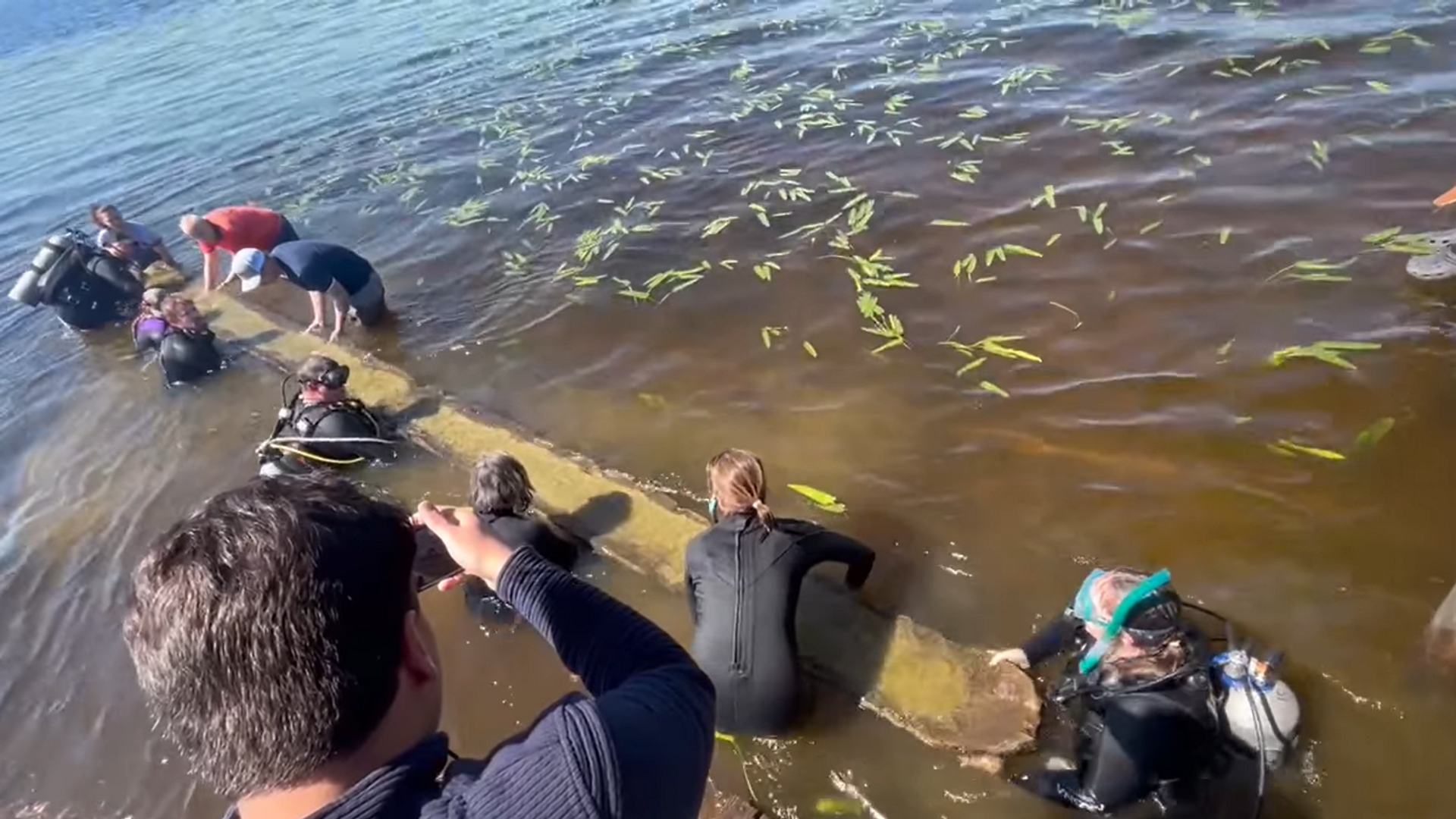https://sputnikglobe.com/20230422/nearly-1000-year-old-native-american-canoe-is-found-in-north-carolina-lake-1109752526.html
Nearly 1,000-Year-Old Native American Canoe is Found in North Carolina Lake
Nearly 1,000-Year-Old Native American Canoe is Found in North Carolina Lake
Sputnik International
A 930-year-old, 28-foot Native American canoe was retrieved from Lake Waccamaw by a team of archaeologists, locals, and members of the Waccamaw Siouan Tribe, two years after it was accidentally discovered by a group of teenagers.
2023-04-22T02:46+0000
2023-04-22T02:46+0000
2023-04-22T02:46+0000
beyond politics
history
ancient history
native american
https://cdn1.img.sputnikglobe.com/img/07e7/04/16/1109752368_45:0:1321:718_1920x0_80_0_0_1c8a946142eaf37087c80bfda019f849.png
A 930-year-old, 28-foot Native American canoe was retrieved from Lake Waccamaw on Wednesday, two years after it was accidentally discovered by a group of teenagers. A team of archaeologists, locals including the boys who discovered the canoe, and members of the Waccamaw Siouan Tribe all worked together to retrieve the exciting discovery.The three teenagers who first discovered the canoe in the 9,000-acre lake include eyewitness Eli Hill, who mistook the canoe for a log. He and his friends then returned to remove it with a shovel.“I tried to pick it up and it never came up,” said Hill. “So we kept digging at it and it just kept going. And then the next day, we came back and we started digging some more and it just kept going.”Hill and his family then reached out to the state’s archeology office, beginning the two-year process of retrieving the artifact.Michael Jacobs, the Waccamaw Siouan Chief said it was a rare and emotional moment for him and his elders who sat on the bank and cried tears of “joy, tears of sadness, tears of a future for our youth [and] how this is going to impact them and help them overcome some of the trauma they’ve experienced through being excluded at times, and even counted as not worthy”.The canoe will be taken to a lab where its wood will be treated to help preserve the relic before studying it. The canoe will be on display during an open house at the Queen Anne’s Revenge Conservation Laboratory in Greenville on Saturday.“We’re looking forward to examining it, running some tests on it, really finding out and going back to our elders and getting the history of it to where we can teach the truth to our people and know that we’ve got concrete evidence to stand on,” said Jacobs.“Our history is still unfolding,” said Jacobs. “When the colonists made contact with our tribe, there’s a lot of the things that we hailed as historical and meaningful to us that we’re still putting together.”
Sputnik International
feedback@sputniknews.com
+74956456601
MIA „Rossiya Segodnya“
2023
News
en_EN
Sputnik International
feedback@sputniknews.com
+74956456601
MIA „Rossiya Segodnya“
Sputnik International
feedback@sputniknews.com
+74956456601
MIA „Rossiya Segodnya“
ancient history, native american history, archeology, artifacts, north carolina, canoe, ancient canoe
ancient history, native american history, archeology, artifacts, north carolina, canoe, ancient canoe
Nearly 1,000-Year-Old Native American Canoe is Found in North Carolina Lake
The canoe was first discovered by a group of teenagers in the summer of 2021, the three boys were inner tubing on a lake in North Carolina when they discovered the canoe.
A 930-year-old, 28-foot Native American canoe was retrieved from Lake Waccamaw on Wednesday, two years after it was accidentally discovered by a group of teenagers. A team of archaeologists, locals including the boys who discovered the canoe, and members of the Waccamaw Siouan Tribe all worked together to retrieve the exciting discovery.
The three teenagers who first discovered the canoe in the 9,000-acre lake include eyewitness Eli Hill, who mistook the canoe for a log. He and his friends then returned to remove it with a shovel.
“I tried to pick it up and it never came up,” said Hill. “So we kept digging at it and it just kept going. And then the next day, we came back and we started digging some more and it just kept going.”
Hill and his family then reached out to the state’s archeology office, beginning the two-year process of retrieving the artifact.
“This canoe is about 1,000 years old, and it’s a south-eastern Indian canoe, and it originated from this area… so we wanted the local Indian group to be part of it and share with the agency of it,” added North Carolina archaeologist John Mintz.
Michael Jacobs, the Waccamaw Siouan Chief said it was a rare and emotional moment for him and his elders who sat on the bank and cried tears of “joy, tears of sadness, tears of a future for our youth [and] how this is going to impact them and help them overcome some of the trauma they’ve experienced through being excluded at times, and even counted as not worthy”.
“That canoe at 28 feet long would have carried many a brave,” said Jacobs. “We feel like in our heart, it’s a history that we’re still exploring and understanding because this is the first time we’ve had access.”
The canoe will be taken to a lab where its wood will be treated to help preserve the relic before studying it. The canoe will be on display during an open house at the Queen Anne’s Revenge Conservation Laboratory in Greenville on
Saturday.
“We’re looking forward to examining it, running some tests on it, really finding out and going back to our elders and getting the history of it to where we can teach the truth to our people and know that we’ve got concrete evidence to stand on,” said Jacobs.
“Our history is still unfolding,” said Jacobs. “When the colonists made contact with our tribe, there’s a lot of the things that we hailed as historical and meaningful to us that we’re still putting together.”


